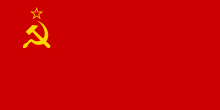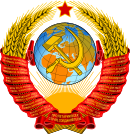Советский народ | |
|---|---|
 | |
 Map of the country's constituent Union Republics in 1989 | |
| Total population | |
| 286,730,819 (1989 census) | |
| Languages | |
| Russian,[1] Ukrainian, Belarusian, Kazakh, Azerbaijani, Georgian, Armenian, Uzbek, Kyrgyz, Tajik, Turkmen, Latvian, Estonian, Romanian, Lithuanian, others (see: Languages of the Soviet Union) | |
| Religion | |
| Christianity, Islam, Judaism, Buddhism, Atheism, others (see: Religion in the Soviet Union) | |
| Related ethnic groups | |
| Citizens of the post-Soviet states |
| Part of a series on the |
| Culture of the Soviet Union |
|---|
 |
| People |
| Languages |
| Traditions |
| Cuisine |
| Festivals |
| Literature |
| Music |
| Sport |
The Soviet people (Russian: сове́тский наро́д sovyétsky naród) were the citizens and nationals of the Soviet Union. This demonym was presented in the ideology of the country as the "new historical unity of peoples of different nationalities" (новая историческая общность людей различных национальностей).[2]
YouTube Encyclopedic
-
1/5Views:13 878326 15416 93019 16451 266
-
People From the Soviet South. Life in the USSR. Part 1 #ussr, #sovietpeople
-
How Khrushchev Fed the Soviet People
-
How Did Soviet People Buy Their Clothes? Was it Expensive? #ussr
-
Soviet People and Racism in the USSR #ussr, #soviet
-
Why Soviet People Were So Poor if Housing Was So Cheap? #ussr
Transcription
Nationality policy in the Soviet Union
During the history of the Soviet Union, different doctrines and practices on ethnic distinctions within the Soviet population were applied at different times. Minority national cultures were never completely abolished. Instead the Soviet definition of national cultures required them to be "socialist by content and national by form", an approach that was used to promote the official aims and values of the state. The goal was always to cement the nationalities together in a common state structure. In the 1920s and the early 1930s, the policy of national delimitation was used to demarcate separate areas of national culture into territorial-administrative units, and the policy of korenizatsiya (indigenisation) was used to promote involvement non-Russian nationalities in government on all levels and strengthen non-Russian languages and cultures. By the late 1930s, however, the policy was changed to a more active promotion of the Russian language and later to more overt Russification, which accelerated in the 1950s,[citation needed] especially in Soviet education. Although some assimilation did occur, it did not on the whole succeed. The continued development of the many national cultures in the Soviet Union led to the drafting of the New Union Treaty in 1991 and the subsequent dissolution of the Soviet Union.[3]
Researchers' assessments
Assessments of the success of the creation of the new community are divergent. On the one hand, the ethnologist V. A. Tishkov and other historians believe that "for all the socio-political deformities, the Soviet people represented a civil nation."[4][5] The philosopher and sociologist B. A. Grushin noted that sociology in the USSR "recorded a unique historical type of society that had already gone into oblivion". At the same time, according to the sociologist T.N. Zaslavskaya, it "did not solve the main task associated with the typological identification of Soviet society".
Some historians evaluating the Soviet Union as a colonial empire (Soviet empire), applied the "prison of nations" idea to the USSR. Thomas Winderl wrote "The USSR became in a certain sense more a prison-house of nations than the old Empire had ever been."[6]
In an interview with Euronews in 2011, Russian President Dmitry Medvedev recalled the use of the term "Soviet people" as a "unified community" in the Soviet Union but added that "these constructions were largely theoretical".[7]
Post-Soviet Russia
In contrast to Soviet national identity politics, which declared the Soviet people as a supranational community, the post-Soviet Russian Constitution speaks of a "multinational people of the Russian Federation". From the outset, the idea of the "Russian nation" as a community of all Russian citizens has met with opposition.[8]
In December 2010, Russian President Dmitry Medvedev pointed out the lack of an all-Russian unifying idea as a problem during a discussion in the State Council and proposed multiethnic patriotism as a replacement for the idea of "the Soviet people".[9]
See also
- Demographics of the Soviet Union
- Homo Sovieticus
- Melting pot
- New Soviet man
- Orthodoxy, Autocracy, and Nationality – the ideological doctrine of Russian emperor Nicholas I
- Rootless cosmopolitan
- Russification
- Zhonghua minzu – the equivalent notion in the People's Republic of China
- Yugoslavs
References
- ^ "Language Policy in the former Soviet Union". H. Schiffman. University of Pennsylvania. 19 November 2002.
- ^ Great Soviet Encyclopedia, article "Советский народ" by Suren Kaltakhchian
- ^ Anderson, Barbara A.; Silver, Brian D. (2019). "Some Factors in the Linguistic and Ethnic Russification of Soviet Nationalities: Is Everyone Becoming Russian?". In Hajda, Lubomyr; Beissinger, Mark (eds.). The Nationality Factor in Soviet Politics and Society. Routledge. pp. 95–130. ISBN 9781000303766.
- ^ "Российский народ и национальная идентичность". Известия (in Russian). 2007-06-19. Retrieved 2021-08-09.
- ^ admin. "СОВЕТСКИЙ НАРОД: ГОСУДАРСТВЕННО-ПОЛИТИЧЕСКИЙ КОНСТРУКТ | Аналитика культурологии". analiculturolog.ru (in Russian). Retrieved 2021-08-09.
- ^ Bekus, Nelly (2010-01-01). Struggle Over Identity: The Official and the Alternative "Belarusianness". Central European University Press. p. 42. ISBN 978-963-9776-68-5.
- ^ ГРИШИН, Александр (2011-09-10). "Дмитрий Медведев: "Термин "советский народ" оказался теоретическим"". kp.ru (in Russian). Retrieved 2021-08-09.
- ^ Malinova O. "Symbolic politics and the construction of macropolitical identity in post-Soviet Russia". Polis. Political Studies. 2: 90–105.
- ^ "Власти РФ предлагают укреплять общество "общероссийским патриотизмом"". РИА Новости (in Russian). 2010-12-27. Retrieved 2021-08-09.
External links
- The Soviet People—A New Historical Community, a Soviet work from 1974 expounding on the concept
- Present-Day Ethnic Processes in the USSR, a Soviet work from 1982
